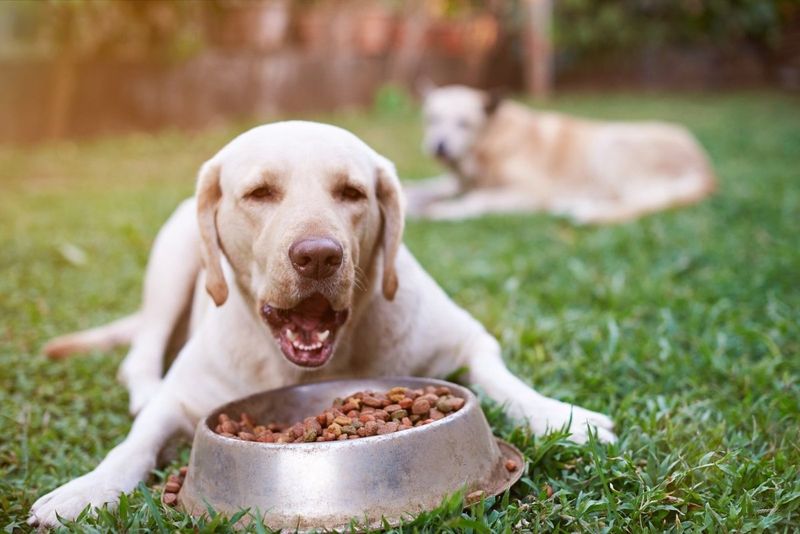Why Is My Dog Always Hungry? 11 Possible Reasons

Have you ever wondered why your furry friend seems to have a bottomless pit instead of a stomach?
Dogs, much like humans, have various reasons for their insatiable appetites. While some reasons are perfectly harmless, others might require a bit more attention.
Whether it’s those irresistible puppy eyes or a deeper health issue, understanding the cause of your dog’s constant hunger can help you ensure they’re living their best life.
Let’s explore 11 fascinating reasons behind your dog’s never-ending hunger and what you can do about it.
1. High Energy Levels

Dogs with high energy levels burn calories quickly. Breeds like Border Collies or Jack Russells are often on the go, requiring more fuel to keep up with their active lifestyle.
High-energy dogs might seem constantly hungry because their bodies naturally demand more food to support their activity levels.
Ensuring they have a nutritious diet rich in proteins and healthy fats can help maintain their energy without overfeeding. Sometimes, adding a little extra kibble can make a world of difference!
Keeping them engaged with activities helps manage their caloric needs effectively.
2. Growing Puppies

Puppies are growing powerhouses! Their bodies require plenty of nutrients to support rapid growth and development, which can make them seem constantly hungry. This is entirely normal and expected.
Providing a well-balanced diet with essential vitamins and minerals supports their blossoming bodies. Frequent, small meals are often recommended for these little ones.
As they grow, their appetite will gradually stabilize, but during puppyhood, it’s all about ensuring they get what they need for healthy development.
3. Underlying Health Issues

Health conditions like diabetes or thyroid problems can increase a dog’s appetite significantly. Such issues might require medical intervention.
Increased hunger can be a symptom of underlying health concerns, and catching these early is crucial for treatment. Regular vet check-ups help in spotting any anomalies in your dog’s health.
If your dog’s hunger seems unusual or excessive, it’s wise to seek professional advice to rule out or address health problems.
4. Learned Behavior

Dogs are smart creatures and can learn that begging leads to treats. If a dog is rewarded with food every time they ask, they’ll continue the behavior.
It’s essential to set boundaries and avoid reinforcing this habit. Consistent training can mitigate this behavior, helping your dog understand that begging won’t lead to more treats.
Positive reinforcement with non-food rewards can also aid in breaking this cycle. Remember, a well-behaved dog is a happy dog!
5. Emotional Eating

Just like humans, dogs can eat for comfort when stressed or anxious. Emotional eating is common in dogs left alone for long periods.
Creating a calming environment and ensuring plenty of mental stimulation can reduce stress-related eating. Toys, walks, and interaction can make a big difference.
Recognizing the signs of emotional eating can help in addressing the root cause and ensuring your dog’s well-being.
6. Medication Side Effects

Certain medications can increase a dog’s hunger as a side effect. Steroids, for instance, are known to boost appetite.
If your dog has recently started medication and seems hungrier than usual, consult your vet. They might adjust the dosage or suggest alternatives.
Understanding medication effects can help manage your dog’s appetite and ensure they’re not overeating.
7. Lack Of Physical Activity

Dogs not getting enough exercise may appear hungrier due to boredom. Physical activity helps regulate appetite and keeps them physically fit.
Ensuring your dog gets regular walks and playtime can help manage their hunger. Active dogs are healthier and happier.
Incorporating exercise into daily routines benefits their overall well-being, reducing unnecessary eating.
8. Parasites

Parasites like worms can steal nutrients from dogs, making them feel perpetually hungry. These tiny invaders are sneaky but treatable.
Regular deworming and vet visits ensure parasites don’t stand a chance. If you notice increased hunger along with weight loss or other symptoms, it might be time for a check-up.
Preventative care is key in keeping your dog healthy and parasite-free.
9. Aging Dogs

As dogs age, their metabolism and dietary needs change. Older dogs may require different nutrients or more food to feel full.
Adjusting their diet according to their age helps manage their hunger. Senior dog food often contains supplements for joint health and digestion.
Consulting your vet about diet changes can make a happy, healthy difference for aging dogs.
10. Breeds With Big Appetites

Certain breeds are known for their robust appetites. Large breeds like Saint Bernards or Mastiffs are notorious for their love of food.
Understanding your dog’s breed helps in managing their dietary needs. Tailoring portions to their size and energy levels is crucial.
Providing enriching activities can also satisfy their insatiable appetites without overfeeding. Knowing your breed’s traits is key to happy feeding.
11. Poor Quality Dog Food

Feeding your dog poor quality food might be why they always seem hungry.
Low-quality dog foods often contain fillers and byproducts that do not provide sufficient nutrition, leaving your dog unsatisfied after meals. This dissatisfaction can manifest as constant hunger.
Switching to high-quality dog food, which is rich in proteins and other essential nutrients, can help your dog feel fuller for longer.
It’s crucial to read labels and ensure that the food you choose meets high nutritional standards.






